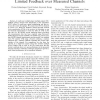Free Online Productivity Tools
i2Speak
i2Symbol
i2OCR
iTex2Img
iWeb2Print
iWeb2Shot
i2Type
iPdf2Split
iPdf2Merge
i2Bopomofo
i2Arabic
i2Style
i2Image
i2PDF
iLatex2Rtf
Sci2ools
125
click to vote
GLOBECOM
2008
IEEE
2008
IEEE
Performance of Multi-User MIMO Precoding with Limited Feedback over Measured Channels
Abstract—In multi-user multiple-input multiple-output (MUMIMO) systems, channel state information at the transmitter (CSIT) allows for multi-user spatial multiplexing and thus increases the system throughput. We assume that CSIT is obtained by means of a finite-rate feedback channel through channel vector quantization (CVQ) at the receiver. In this paper we use real channel measurements to study the effect of CVQ on the sum rate of a MU-MIMO system employing linear precoding. The measurement data has been acquired using Eurecom’s MIMO Openair Sounder (EMOS). The EMOS can perform realtime MIMO channel measurements synchronously over multiple users. We consider CVQ using a Fourier codebook, a random codebook and a random codebook exploiting the second order statistics of the channel. For comparison, we also show the capacity of a single-user system using time division multiple access (TDMA) with no CSIT at all. The results show that the Fourier codebook shows very poor performance i...
Related Content
| Added | 29 May 2010 |
| Updated | 29 May 2010 |
| Type | Conference |
| Year | 2008 |
| Where | GLOBECOM |
| Authors | Florian Kaltenberger, David Gesbert, Raymond Knopp, Marios Kountouris |
Comments (0)

